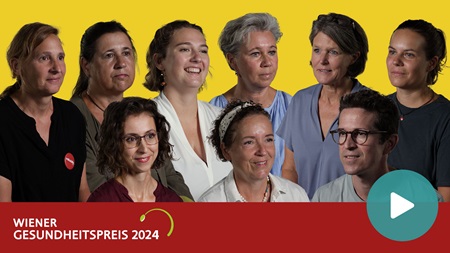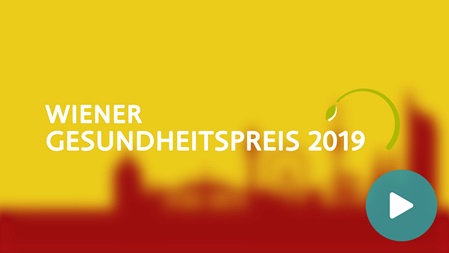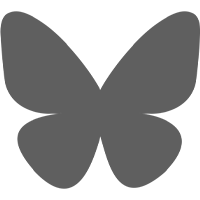Bernadette Waschkau-Homberg: The school I come from is a school for children with increased special educational needs in the 21st district. I am a class teacher and my grade level, meaning the children I teach, are between eight and nine. It started because, due to Corona, as a school, we had to forgo many things. So my colleague Karin and I thought about how we could practically stay up to date. We are a school for children with increased special educational needs. These are children with intellectual disabilities. We get a bus budget for that, that was the advantage. So we were allowed to go away once a week, that's what we set out to do. I also have a qualification as a forest educator. We were in all the Viennese forests, I think, and also traveled partially to Lower Austria. We were really outside once a week, fixed. But that wasn't enough for us then. We said we'd start with running training. That starts with 500 meters, and we increase. Our route was then between two and three kilometers. At first, we were a little bit ridiculed, but basically it turned out that seven or eight classes said: That's a good idea, costs nothing. So running gear, yes please. But still, eight classes going for a run at once. For the children's fitness, who then also learn more easily, things stick better, and the children can concentrate better, and their snack tastes better too. And as feedback it was also the case that the parents said, they simply notice that the children have become fitter, that the children enjoy moving and demand it themselves. That was our goal.
Miriam Ablöscher: It is known from literature and also from practical experience in hospitals that treatment errors but also incidents with patients repeatedly lead to staff in the hospital being traumatized. There's a technical term for this. It's called the Second Victim phenomenon. With the project "Kollegiale Hilfe" (Colleague Support), we want to establish at Klinik Hietzing a comprehensive network of psychological first responders by colleagues for colleagues. Meanwhile, we have already trained 112 colleague helpers at Klinik Hietzing. And we have already had over 20 successful and very helpful deployments, in which we succeeded in providing emotional support to staff after particularly stressful events at the workplace and providing them with psychological first aid. It's also important that the KoHi (Colleague Helper) is not a supervisor. The collegial conversation is confidential and takes place during working hours. Through "Kollegiale Hilfe", we have succeeded in further developing the error culture at Klinik Hietzing. In Austrian hospitals, these support programs have not been a matter of course until now. Therefore, the "Kollegiale Hilfe" project is also considered a showcase project or a good model project in the entire German-speaking area.
Geraldine Smetazko: The Kuratorium Wiener Pensionistenwohnhäuser (Viennese Retirement Homes Board) is the largest provider of senior care in Austria. In 2018, during Pride, I somehow realized that there was nothing for LGTBQIA seniors, meaning for the target group I actually work with. And so the project idea was born. In an interdisciplinary team with 12 employees, we developed a catalog of measures that should make this group of LGTBQIA seniors visible and raise awareness for them. And then, subsequently, of course, also promote the normalization of queerness in everyday life. One of the most important and earliest findings in the project was that the target group of LGTBQIA seniors is itself very hidden. This means it's difficult to get in touch with them, which can of course be explained by their own biography. And from the mindset in which they grew up. This means we had to find other ways than direct engagement. And so we decided that, on the one hand, we would go through the employees, strengthening and sensitizing them, and on the other hand, also work with visual messages, so that we can then create an inclusive atmosphere, where all residents know that they are, regardless of their sexual orientation or gender identity, very welcome with us and will be cared for just as well as everyone else.
Eva Trettler: FEM Süd also implemented the project WERTVOLL - Mädchen im Blickpunkt (VALUABLE - Girls in Focus) thanks to the funding from Wiener Gesundheitsförderung (Vienna Health Promotion) and the support from MA 13 Stadt Wien - Bildung und Jugend (City of Vienna - Education and Youth). The vision of the project was to perceive girls as shapers of their own lives and to empower them in this regard. Also to question role models together with them and to show them new ways and also to support them in their developmental tasks. We implemented workshop series on various topics, but also carried out small projects together with the girls. And, for example, we also take a trip to a climbing park or did laughter yoga together with the girls. The project ran from March 2018 to December 2020. And in the course of this project, we reached a total of over 3500 girls, mothers, and multipliers, and conducted almost 700 hours of workshops. A very nice result of the project was also our collection of methods, a collection of exercises with tips and tricks, also in times of Corona, on how I can specifically work with girls. We compiled exercises on various topics such as sexuality, friendship, relationships, violence, and also prepared them in a collection of methods. Finally, we would like to thank the girls, of course, who participated in this project, and we were able to experience truly great and exciting workshops together with the girls, which will remain in our memory for a long time.











